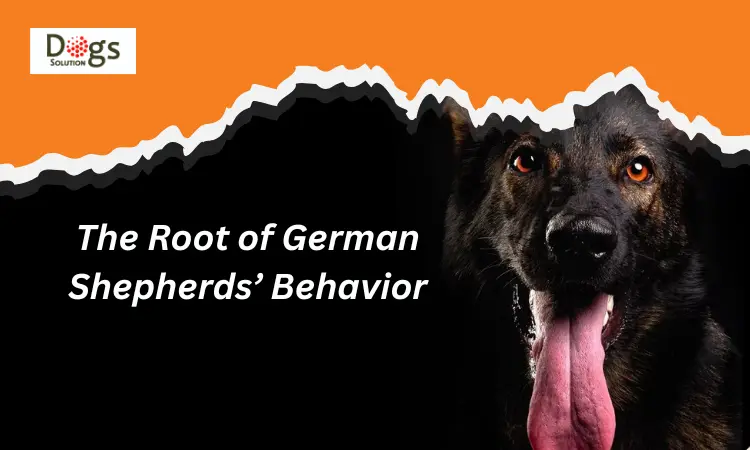German Shepherds frequently hold the top spot among dog breeds that are intelligent and adaptable. These gorgeous dogs are known for their devotion, agility, and exceptional working skills. They have won the hearts of doggy lovers all around the world. But today’s question is; How to Train a German Shepherd ? or Are German shepherds easy to train?
In this interesting blog, we set out on a quest to learn the truth about the trainability of German Shepherds. Join us as we examine their outstanding cognitive talents and discuss the elements contributing to german shepherd training potential, like a police dog. So, let’s explore; how to train a German shepherd.
The Root of German Shepherds’ Behavior in the Sense of Trainability:
German Shepherds have gained a unique place in the hearts of dog lovers worldwide because of their stunning beauty and steadfast devotion. Understanding the causes of your German Shepherd’s behavior and how it affects their trainability is crucial when you start the training process.

Remember that your German Shepherd’s behavior is firmly based on their lineage, intellect, and intrinsic features when you set out to teach them. Their intellect, working heritage, and intense desire to please their human companions contribute to their trainability.
By comprehending these core concepts, you may adjust your training strategy to utilize their special abilities best. Take advantage of the chance to educate your German Shepherd with persistence, patience, and praise.
Establish a solid relationship based on mutual respect and understanding and watch as they evolve as they learn new instructions, jobs, and behaviors. If you fully grasp how they behave, you may unleash their full potential and create a lasting relationship based on mutual respect and appreciation.
Factors That Make a German Shepherd Trainable:
German Shepherds are renowned for being extremely trainable. They are frequently sought after for various job duties, including service dog employment, search and rescue, and military and police work. Their trainability depends on several criteria, including:

Intelligence:
The most intellectual dog breeds include German Shepherds. They are extremely trainable because of their keen brain and capacity to comprehend and pick up new orders quickly. They naturally solve problems and can easily understand challenging tasks.
Eagerness to Please:
The desire to please their masters is quite high in German Shepherds. They want affirmation and thrive on praise, which keeps them motivated and focused during training sessions. This desire to please strengthens the link between the dog and its handler and makes them easier to teach.
High Work Ethics:
German Shepherds are diligent and have a strong work ethic. They are prepared to put up the work and concentration necessary to finish projects and perform successfully. This quality is essential for jobs that need obedience, agility, and focus.
Interaction:
The capacity to be trained a German Shepherd depends critically on early and intensive interaction with others. Dogs socialized appropriately are more tolerant of unfamiliar surroundings, people, and circumstances.
A well-rounded and trainable German Shepherd is shaped by positive encounters with other dogs, animals, and various situations during the crucial socialization stage (often between 3 and 16 weeks of age).
Handler Relationship:
German Shepherds benefit from having a close relationship with their owners. Their trainability is increased by establishing a pleasant and trustworthy connection via frequent training, open communication, and mutual respect.
The handler’s effective leadership and balanced, disciplined approach influence the dog’s readiness to obey directions and carry out duties.
Physical Competencies:
German Shepherds have physical characteristics that make them easier to teach. They have tremendous endurance and are powerful, fast, and elegant. Because of these characteristics, they are ideally suited for activities that demand physical performance, including agility courses or search and rescue missions.
Versatility:
German Shepherds are adaptable canines that can cope with various german shepherd training situations. GSD Dogs aptitude for many tasks, like obedience, tracking, scent work, and protection work, demonstrates their trainability in various settings and tasks.
How to Train a German Shepherd?

Teaching a German Shepherd to behave as a police dog must be organized and focused. While it’s best to leave professional police dog training to the pros, you may use basic guidelines to teach your German Shepherd with concentration and discipline. To get you started, follow these steps:
Initially, practice basic obedience:
To lay a solid foundation, teach your German Shepherd the fundamental obedience commands of sit, stay, down, come, and heel. Repetition, consistency, and positive reinforcement are essential. Reinforce desired behaviors by giving out gifts or praise as rewards.
Focus and Leash Training:
Teach your German Shepherd to focus on you while walking on a leash without tugging. This ability is essential for police dogs to remain attentive to their handlers’ directions in various circumstances.
Socialization:
Immediately introduce new situations, people, animals, and places to your German Shepherd. They will grow more capable and self-assured, two essential qualities for police dogs.
Training in Scent:
Play activities like tracking or search and rescue to introduce your German Shepherd to scent work. Start with straightforward concealing and discovering tasks using objects with unique odors, then go to more difficult settings.
Physical fitness and nimbleness:
Regular physical activity and agility training can help your German Shepherd gain strength, stamina, and coordination. They will do better overall and be more prepared for more difficult training.
Training for Controlled Aggression:
Training your German Shepherd to respond correctly to protection and apprehend instructions is a part of controlled aggression. To guarantee safety and correct technique, this training should only be carried out under the direction of a qualified expert.
Techniques for Advanced Training:
As you improve, you can learn more sophisticated training methods, including biting work, apprehension exercises, obstacle courses, and challenging obedience exercises. These must be done while supervised by knowledgeable instructors focusing on training police dogs.
Patience and consistency:
It requires persistence, patience, and time to train a German Shepherd to behave like a police dog. Maintain a regular practice schedule and disciplined training regimen. To avoid physical or mental exhaustion, keep training sessions brief and intense.
Last Words: Are German Shepherds Easy to Train ?
Due to their high intellect, desire to please, and strong work ethic, German Shepherds are typically considered simple to teach. Their trainability is influenced by both their innate skills and openness to learning. It’s crucial to remember that every German Shepherd is an individual, and some may have different trainability depending on their genetics, temperament, and early experiences.
Their innate trainability can be maximized, and their full potential as smart and capable working dogs can be unlocked with the help of consistent and positive training techniques, the correct environment, and proper direction. Keeping this in mind, it takes knowledge and experience dealing with working dogs to train a German Shepherd to the level of a police dog.
If you want to teach your German Shepherd to this level, consider hiring a trainer or enrolling in a program specifically for working dogs. These programs will provide you and your German Shepherd with the direction, tools, and know-how you need to accomplish your goals securely and efficiently.
How to Train a German Shepherd to be friendly?
Giving a German Shepherd plenty of socialization from a young age and introducing them to different people, animals, and situations will help you educate them to be friendly. Reward calm, cordial behavior by using positive reinforcement; divert or discourage any symptoms of aggressiveness or fear. Your German Shepherd will grow into a well-mannered, amiable companion with consistent training, patience, and rewarding experiences.
How to train a German shepherd as a guard dog?
Focus on teaching the German Shepherd instructions “alert” and “guard” during obedience training if you wish to train it to be a guard dog. With an emphasis on controlled aggression training and strengthening defensive instincts, work with a professional trainer to guarantee correct practices and safety.
Are German shepherds easy to potty train?
Yes, with standard and encouraging reinforcement techniques, German Shepherds can be trained to use the restroom easily. Successful toilet training may be achieved by creating a schedule, utilizing positive reinforcement for desired bathroom behaviors, and being consistent with training.






